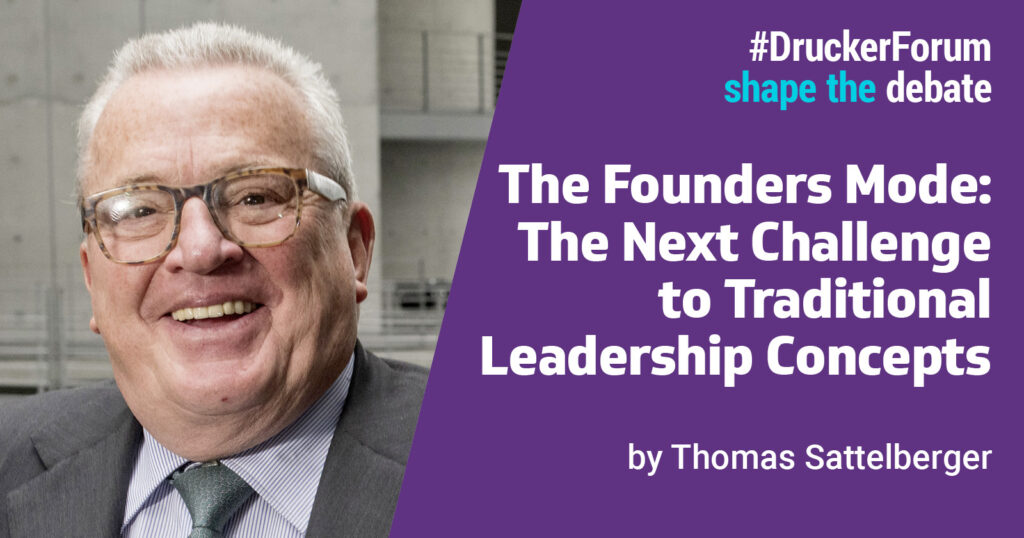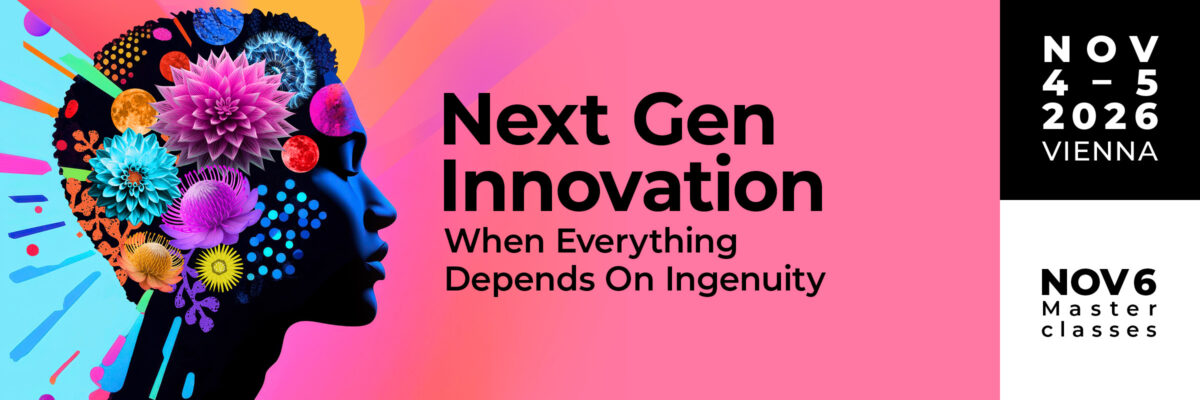
The Global Peter Drucker Forum 2025 in Vienna is dedicated to the topic of “Next Era Leadership,” or the challenge to leadership in our times of multiple crises and upheavals. Peter Drucker warned us in his day: “The greatest danger in times of turbulence is not the turbulence; it is to act with yesterday’s logic.”
As a transformation manager who has steered corporations through crises and the necessary changes, you have learned how to act in turbulent times. You are also a long-standing critic of the “old” management logic and of business schools as its purveyors. We would therefore like to talk to you about Next Leadership – and specifically about a “third mode” of leadership.
1. Germany and its double weakness
Marc Wagner:
First of all: Germany seems to be experiencing a fundamental crisis and at the same time a leadership crisis. What do you make of the current challenge?
Thomas Sattelberger:
We are facing a double weakness: economically and in terms of leadership culture. Germany has fallen dramatically behind in international competitiveness – we are ranked 19th out of 64 nations in the IMD Global Competitive Ranking and 48th in a sub-category that includes leadership. Not much more than 10 years ago, we were ranked 6th worldwide. There has been some recent progress, for example in skilled immigration, but this is just not enough.
Many key issues are not decided but just administered. And this is also reflected in leadership behaviour: There is a dangerous leadership gap – in politics, but also business. Leadership is not created by titles or hierarchical status, but by taking hands-on responsibility in the face of challenge, not by delegation.This is the core of the “founders’ mode”, which basically stands a courageous down-to-earth approach with one’s own teams.
2. Long-Term Recovery
Winfried Felser:
How quickly will we be able to find the right solutions for recovery – including political ones? How dangerous is the current lean period?
Thomas Sattelberger:
I’m sceptical about a quick recovery. I’m not yet convinced that we can expect an upswing in the near future.
For example, progressive nations are now building nuclear power plants to feed highly energy-intensive AI. While we’ve made marginal improvements in the current governing coalition, there’s no action on core issues. A sustainable restructuring of the rampant welfare state, for example, hasn’t been addressed at all, and nuclear power is taboo.
I currently believe that, in the absence of reform, we’ll probably crawl along like Austria until the next election in 2029. These years, plus at least five subsequent years of recovery, mean we have about 10 lean years ahead of us.
One result, of course, would be the extreme fragilization of the political system. It would gnaw away at the last non-extreme mainstream parties, eroding the Christian Democrats (CDU), and the Social Democrats (SPD) will shrink even further. Besides the rightist AfD, we’ll then have a hodgepodge of small and medium-sized parties. Hands-on political leadership like former British Prime Minister Margaret Thatcher or today Prime Minister Kyriakos Mitsotakis in Greece is essential, especially in such phases.
3. Founders Mode: A Third Form of Leadership
Marc Wagner:
You’re an evangelist for the term “Founders Mode” as an alternative to traditional managerial thinking. What exactly do you mean by it? Is Founders Mode a kind of hybrid path between the previous alternatives of directive and delegative leadership?
Thomas Sattelberger:
No, Founders Mode is not a hybrid of directive and delegative leadership. It is a third type of leadership – deeply immersed in the details of customer and product and partnering on equal terms with engineers and workers – like Werner von Siemens and Robert Bosch in the founding era of the industrial age, like Steve Jobs and Brian Chesky in the founding era of the digital age, or like the German Mittelstand in the decades after World War II. These were never helicopter managers who merely delegated but rather tackled the problem at source – as in the Toyota principle of Genchi Genbutsu, roughly ‘“go and see for yourself”. This is crucial for companies undergoing transformation – including and especially in Mittelstand companies. They have a powerful entrepreneurial DNA that resists rigid hierarchy. Unfortunately, Mittelstand companies are increasingly adopting large-corporation structures.
4. Founder’s Mode on the Rise – In Politics too?
Winfried Felser:
Where can the innovative thinking for a new leadership logic come from? What can be applied to our political future? Does new political leadership create the potential for an accelerated recovery?
Thomas Sattelberger:
Let’s first talk about business. Innovation and change rarely occur in the centre – it arises at the edges, in the periphery of organization and society. Sixty per cent of Silicon Valley founders are migrants or children and grandchildren of migrants. These are people who don’t care about being politically correct, who have different perspectives, and unconventional drives. In Germany, nonconformists are often weeded out or put in a corner. “Crazy people,” as I call them – colourful peacocks, deer who break from the herd. But it’s these crazy people who embody what the Founders Mode needs: rule-breaking and individuality. Unfortunately, our business schools and consulting firms frequently promote the opposite – routinizing traditional behaviour instead of questioning it.
Crisis also gives birth to new leadership in the political context. Margaret Thatcher was a backbencher, the daughter of a British grocer from the provinces. People laughed at her, and then she became the Iron Lady. Margaret Thatcher reinvented Great Britain – perhaps not in every detail in line with the Founders Mode, but certainly on key issues. Even Labour Prime Minister Tony Blair has acknowledged the necessity of her radical reforms.
5. Founders Mode in Your Own Life
Winfried Felser:
Based on your own experience, can you elaborate on Founders Mode as a third way of leadership?
Thomas Sattelberger:
On an ocean liner, Founders Mode can only be practiced selectively, if at all. When I joined Telekom, I consciously reduced hierarchies and hierarchical symbols. My next goal was to eliminate titles, especially the infamous “Senior Executive Vice Presidents.” My managers at Telekom always said I was meddling in every detail. But I basically discussed things in partnership with the originator of the idea, right at the base of the hierarchy. I only consulted with those who had come up with the original idea. Middle management then complained, so I invited them in – to listen, but not to speak, which wasn’t popular: I was considered “too direct.” But that’s precisely what transformation requires: proximity to value creation, being present with the people working on the front lines. This is all the truer in the technology-driven Mittelstand. There, this tinkering entrepreneurial spirit is still alive, but increasingly obscured by the logic of control. The new mantra is poverty in regard to hierarchy and direct engagement of leadership and the search for solutions. It’s often denounced as micromanagement.
6. The Traditional Manager – a Discontinued Line?
Marc Wagner:
Is the traditional management mode still relevant in a complex, digital world? Are we facing a paradigm shift similar to the printing press in the Renaissance? What would Peter Drucker, the father of modern management, say today about the established management model? Do we perhaps even need to reinvent Drucker?
Thomas Sattelberger:
The traditional Manager Mode is a child of developed industrial society – efficient, normative, controlling. But in a world full of uncertainty and technological upheaval, exploration is needed over exploitation. Peter Drucker was the management pioneer and thought leader of his time. If he were still alive today, Drucker would have to reinvent himself. I hope that’s not heresy.
Drucker’s later years were in the 1990s, and that was just the decade of the World Wide Web. He was essentially only familiar with corporate structures like Ford, Digital Equipment, or US Steel. He barely experienced the new digital founding era. We are currently experiencing the automation of traditional management by AI. That’s why I say that while we may not need a new leadership theory, we certainly need a new leadership practice. Founders Mode is this – a pioneering approach to reality.
7. AI and Founders Mode as best friends?
Marc Wagner:
Is AI to be seen here as a liberator or another instrument of control? Is Founders Mode perhaps a complementary key to leadership for a comprehensive reorientation of digital transformation?
Thomas Sattelberger:
In Germany, tips and tricks dominate when it comes to AI – the art of the best prompt. AI is used here to make old things more efficient, not to create new ones. But that’s not a vision; it’s micromanagement in new clothing.
Founders Mode, on the other hand, sees AI as liberating people from administration, hierarchy and control: AI takes over routine coordination so that people can again focus on what matters most—curiosity, judgment, creativity. But for that to happen, leaders must realistically move away from efficiency-oriented thinking and towards individual exploration together with their experts
The idea that there is a third alternative alongside directive leadership and delegative leadership must first take root: a debate that was initiated in the Anglo-Saxon world, taken up by me, and focused on companies in transformation. We need an “expedition into the unknown” in business and politics. Leadership must be reinvented—not in PowerPoint battles or business school classrooms, but in the harsh realities of practice, in real transformations.
About the authors:
Born in 1949, Thomas Sattelberger is one of Germany’s most prominent HR and transformation managers. After 20 years at Daimler, he moved to Lufthansa in 1994, where he headed the HR-function and founded the Lufthansa School of Business – the first corporate university in the German-speaking world – before joining the executive board off Lufthansa German Airlines. He served as HR Executive Board member at Continental from 2003 to 2007 and at Deutsche Telekom from 2007 to 2012. Between 2017 and 2022, he represented the liberal party (FDP) in the German Bundestag as spokesperson for innovation and education and was Parliamentary State Secretary for Research in 2021/22. Few are as familiar as he is with the demands of leadership in times of crisis and transformation – the twin challenges now confronting many German and European companies. Can a new entrepreneurial leadership style live up to these formidable demands? Here Thomas Sattelberger shares insights from his experience with Marc Wagner and Winfried Felser, as part of a series of contributions to the Global Peter Drucker Forum 2025.
Marc Wagner is a proven expert on digital transformation, employee experience & new work and was voted Top HR Influencer (Personalmagazin) and among the Top 25 New Workers (Workpath) in 2018 / 2020 / 2022 / 2024. As Senior Vice President People & Organization, he has helped to position Atruvia AG as one of the most attractive IT employers in Germany and also to establish a holistic employee experience approach. In the future, he will scale this know-how as Senior Executive Advisor in the cooperative network and, as Co-CEO, position Lucke GmbH as a digitalization and technology consultancy to bring the #CompanyRenaissance to life.
Dr Winfried Felser is an entrepreneur, future designer and author. As a management consultant and co-founder and deputy head of a Fraunhofer application centre, he has worked on transformation through the network economy and digitalisation. Today, he is the initiator and managing director of NetSkill Solutions GmbH.

